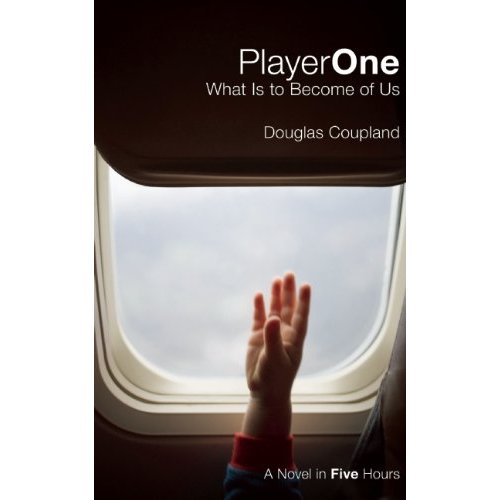Over the course of yesterday afternoon, I listened to Douglas Coupland’s speech he delivered at the 2010 Massey Lectures. Player One: What is to Become of Us is unlike other Massey Lectures. It is a novel, and was read aloud by its author over the course of five hours. It is available in audiobook and hard copy.
 The novel follows five characters, Karen, Rick, Luke, and Rachel, as they arrive in the lounge of an airport bar, as they interact with one another, and as they cope with chaos that erupts as cataclysmic events occur. The story addresses their motivations and perceptions, as well as their thoughts on certain themes. There are several minor characters and a fifth main character, Player One, who retells the events that the four main characters experience but from the perspective of an outside observer, like someone exploring a video game environment.
The novel follows five characters, Karen, Rick, Luke, and Rachel, as they arrive in the lounge of an airport bar, as they interact with one another, and as they cope with chaos that erupts as cataclysmic events occur. The story addresses their motivations and perceptions, as well as their thoughts on certain themes. There are several minor characters and a fifth main character, Player One, who retells the events that the four main characters experience but from the perspective of an outside observer, like someone exploring a video game environment.
The plot revolves around human perception in a time of horror and catastrophe and global change.
This is hard-hitting, at once cold and clinical, yet still, to use extremely overused book-reviewing phrasing, profoundly human. Very frequently I found myself pausing and rewinding the lecture to hear again Coupland’s message.
The cast of characters: Karen, a divorced mother and receptionist in a psychiatrist’s office; Rick, a recovering alcoholic, divorced father, and bartender at the airport cocktail lounge where the novel is set; Luke, a pastor who lost faith in religion and, hours prior to coming to the cocktail lounge, emptied his church’s construction fund of $20,000; Rachel, a nineteen year-old woman, extremely beautiful, but due to a number of neurological conditions–she’s on the Autism spectrum, has prosopagnosia, and is unable to understand humour, metaphors, irony, or social cues–has trouble understanding herself to be human; and Player One, Rachel’s Second Life avatar, who observes the proceedings from a disembodied and somewhat etherial position. Each character brings their own perceptions to bear on the developing environmental and economic disaster–precipitated by the bombing of an OPEC meeting–which caused oil to spike to $900 per barrel, before the power went out.
I don’t want to say I related to any of the characters–I’d never admit to that–but I found Rachel and Luke to be the most compelling. I can empathize with Rachel’s bewilderment at so much of humanity; only through the eyes of an autist can one appreciate just how bizarre we human beings are. But Luke is the one who spoke to me, not because I believe in sin, not for religious reasons, but because I believe in the human capacity to wreak massive, obliterating suffering on itself.
Even with his faith recently nullified, Luke believed in sin. He believes that what separates humanity from everything else in this world is that humanity has, at any moment, the capacity to commit all possible sins. Even those of us who try to live a good and true life remain as far away from grace as the Hillside Strangler, or any demon whoever tried to poison the village well. In Luke’s eyes, sin defined our lives in ways both pathetic and monstrous, and Luke knows that monsters exist.
Entities with human forms but no souls: Ronnie who set fire to his house with his two kids inside, Lacey who extinguished cigarettes on her baby’s forearms. In the face of such monsters, the idea of seven deadly sins seems almost charming, and certainly out of touch with the 21st century. He keeps a running list of things the Church might consider: the willingness to tolerate information overload, the neglect of the maintenance of democracy, the deliberate ignorance of history, the equation of shopping with creativity, the rejection of reflective thinking, and the belief that spectacles reality, vicarious living through celebrity, and more, so much more… “Man,” Luke thinks, “I am one judgmental prick.”
[Addressing the group in the cocktail lounge after the power goes] “You know, in the end, I just got so tired of hearing about the same old seven sins over and over and over again. You’d think that it would be interesting, but it’s not. Would somebody please invite an eighth sin, just to keep things lively? And why do people live so long? What could be the difference between death at 55 or 65 or 75 or 85. Those extra years, what benefit could they possibly have? Why do we go on living when nothing new happens, when nothing new is learned, and nothing new is transmittend? At 55, your story is pretty much over.
“You know, the people I think I feel saddest for are those who once knew what profoundness was, but now lost or became numb to the sensation of wonder, who felt their emotions floating away and just didn’t care, I guess that’s what’s scariest: not caring about that loss.”
– – –
I can’t really articulate what else about the lectures moved me. But it’s there. Like the interspersed definitions from the last chapter of the book, a glossary for the near future. The New York Times published some of Coupland’s terms:
DESELFING Willingly diluting one’s sense of self and ego by plastering the Internet with as much information as possible. (See also Omniscience Fatigue; Undeselfing)
DYSPHORIA Describes the extent to which modern travel strips the traveler of just enough sense of identity so as to create a need to purchase stickers and gift knick-knacks that bolster their sense of slightly eroded personhood: flags of the world, family crests, school and university merchandise.
IKEASIS The desire in daily life and consumer life to cling to “generically” designed objects. This need for clear, unconfusing forms is a means of simplifying life amid an onslaught of information.
PSEUDOALIENATION The inability of humans to create genuinely alienating situations. Anything made by humans is a de facto expression of humanity. Technology cannot be alienating because humans created it. Genuinely alien technologies can be created only by aliens. Technically, a situation one might describe as alienating is, in fact, “humanating.”
INTRAFFINITAL MELANCHOLY VS. EXTRAFFINITAL MELANCHOLY Which is lonelier: to be single and lonely, or to be lonely within a dead relationship?
STANDARD DEVIATION Feeling unique is no indication of uniqueness, and yet it is the feeling of uniqueness that convinces us we have souls.
– – –
But the counterpoint to what I said is also true: I know that people, at any given time, have the capacity to do enormous acts of good.


Leave a Reply